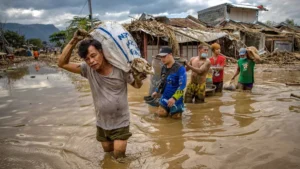Denmark has become the first European country to pledge to pay other countries for any “loss and damage” caused by extreme weather. This commitment comes from Denmark’s Finance Act 2022, which aims to send 60 percent of its climate budget to countries suffering the most from extreme weather. Commenting on this historic humanitarian move, Denmark’s Development Minister Flemming Møller Mortensen stated “it is grossly unfair that the world’s poorest should suffer the most from the consequences of climate change.”

Loss and damage is defined as “the destructive impacts of climate change that cannot be avoided either by mitigation (avoiding and reducing greenhouse gas emissions) or adaptation (adjusting to current and future climate change impacts).”
Loss and damage has become an important topic at the United Nations Climate Conferences in recent years with the increased frequency of extreme weather events and the acknowledgement that poverty and climate change are intrinsically linked. Developing countries are more vulnerable to damage from extreme weather events due to over-reliance on natural resources (tourism, fishing etc.), as well as poor infrastructure. It has been estimated by The Vulnerable 20 – a coalition of the most climate-vulnerable states – that their countries have lost an estimated $525 billion in the last 20 years due to the consequences of climate change.

As it was put by the Danish Development Minister, it isn’t fair for countries that aren’t significantly contributing to global emissions to be paying entirely for the damage caused by climate change. Members of the V20 states only contribute five percent of all global emissions and their combined GDP is valued at USD 2.4 trillion, but they are the worst affected countries by extreme weather.
For example in coastal Bangladesh, salt farming is one of the major sources of employment, however due to the increased frequency of cyclones, heavy rains and rising sea levels, salt production has diminished. This has led Bangladesh to start importing salt in order to keep up with their domestic demand. So not only has climate change impacted the employment levels in Bangladesh, but also their self-reliance.

All the countries of the V20 have gone through colonialisation which has left them with insufficient infrastructure, and ill equipped to deal with the impacts of climate change, such as rising sea levels, flooding, heat waves, drought etc. The call for financial assistance from the developed world, countries which only succeed due to exploitation of their colonies, is only fair.
This move by the Danish government serves as a wake-up call for other countries in the developed world to wake up and also donate their share to the rest of the world that needs it the most. After witnessing the tragedies of the horrific flooding in Pakistan over the past month along with the devastation of Hurricane Fiona in Puerto Rico, it has been proven time and time again, that world’s largest polluters are not going to be the first ones to pay for their actions.
Another Article You Might Like: Why Are Extreme “One-In-A-Lifetime” Weather Events Becoming More Frequent?













